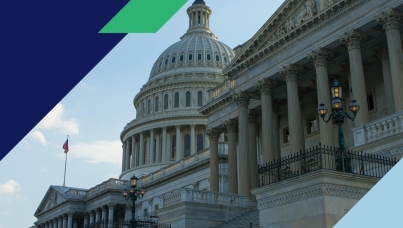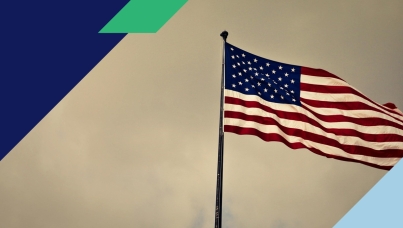Seven in ten Americans say the country is in crisis, at risk of failing
Washington, DC, January 3, 2022- A new NPR/Ipsos poll, conducted nearly a year after the January 6th incident at the U.S. Capitol, finds that Americans hold mixed views on how to characterize the events that unfolded that day – views that are driven primarily by partisan affiliation and news consumption. Moreover, more than one-fifth of the American public agrees that it is sometimes okay to engage in violence, either to protect American democracy or our culture and values. More than three in five disagree. Though many items in this survey underscore the deep political and cultural divisions that exist, one thing is clear: most say American democracy, and America itself, is in crisis and at risk of failing.
Detailed findings:
1. A strong majority of Americans are feeling pessimistic about the state of the country, feeling it is in crisis.
- Overall, 64% agree that American democracy is in crisis and at risk of failing. Even more, 70%, feel the same about America itself.
- A majority, regardless of their gender, racial/ethnic group, generation, or region of the country, feel that America is in crisis and at risk of failing. There is also broad consensus among Democrats (68%), Republicans (79%), and independents (67%) on this.
- However, when you zoom in on political affiliation, Republicans feel this sentiment more acutely than Democrats: 47% of Republicans “strongly agree” with this sentiment, compared to 29% of Democrats.
2. Nearly a year after the Jan. 6th events at the U.S. Capitol, Americans hold mixed perceptions on the event. Moreover, nearly one in four agree there can be certain scenarios where political violence is justified.
- Around one in three (32%) believe the January 6th assault on the U.S. Capitol building was an attempted coup or insurrection, while 28% say it was a riot that got out of control. However, 17% cite a conspiracy – that the events were actually carried out by opponents of Donald Trump, including Antifa and government agents.
- Perceptions vary slightly by education level – those with college degrees are more likely to call it an attempted coup than those without – but the bigger cleavages emerge by partisan affiliation and related factors (such as who you voted for, where you consume news, and the frequency of consuming political news).
- For example, there is a more than 50 percentage point difference between Democrats who consume political news at least weekly and Republicans who do the same, when it comes to beliefs that the event was an attempted coup (65% of Democrats who fall into this category feel this way vs. 11% of Republicans).
- On the other hand, nearly one in three Republicans who are regular political news consumers (30%) say the events were carried out by Antifa/government agents, compared to 7% of Democrats who follow political news closely.
- More than one in five Americans say sometimes it is okay to engage in violence to protect American democracy (24%) or American culture and values (22%). There is no significant difference between all partisans on this; however, there is a difference between Biden voters and Trump voters, specifically, with the latter more inclined to agree with engaging in violence.
3. Around two-thirds of Americans accept the outcome of the 2020 presidential election. However, around a third believe there was fraudulent voting in the election, and another fifth say they are unsure – meaning under half of respondents unequivocally state there was no, or very little, fraudulent voting in the election.
- Sixty-five percent of Americans agree with the statement, “I accept the outcome of the 2020 presidential election.” However, this number falls to fewer than half among Republicans, Trump voters, and those who get their news from Fox News or conservative news media.
- Just under half, 48%, say there was either no fraudulent voting (29%), or very little but it had no impact on the results (19%).
- Twenty-two percent say there was major fraudulent voting, and it changed the results of the election. This number jumps to a 54% majority among those whose primary news source is Fox News or conservative news media, 52% of Trump voters, and 45% of all Republicans.
4. Few Americans are very familiar with the efforts of Republican states legislatures to re-work the mechanisms of elections and when read a short description, more say those efforts will make elections less fair rather than more. On the other hand, several of the measures included in Democrats’ national voting rights plans are broadly viewed as more positive developments.
- Forty-nine percent say standardizing voting rules across states will make American elections more fair compared to only 19% who say it would make elections less fair.
- Notably, an equal number of Democrats and Republicans, 54%, say this will make things more fair. Just 40% of independents feel the same.
- The other leading proposal – allowing any eligible voter to vote by mail – is cited by 44% as a way to make the system more fair. This proposal does not have bipartisan support: twice as many Democrats (62%) as Republicans (31%) say it will make the system more fair.
- Just 15% of Americans say giving state legislatures the power to determine the outcome of an election would make American elections more fair, while 57% say it will make them less fair. In general, views toward proposed election reforms in this poll also vary based on news consumption and the candidate supported in the 2020 election.
About the Study
These are the findings of an NPR/Ipsos poll. The poll was conducted between December 17 - 20, 2021. For this survey, a sample of 1,126 adults ages 18+ from the continental U.S., Alaska, and Hawaii was interviewed online in English. This topline also shows results among those who identify as Democrats, Republicans, and independents. The sample sizes for each are as follows: n=499 Democrats, n=395 Republicans, n=143 independents.
The sample was randomly drawn from Ipsos’ online panel, partner online panel sources, and “river” sampling and does not rely on a population frame in the traditional sense. Ipsos uses fixed sample targets, unique to each study, in drawing a sample. After a sample has been obtained from the Ipsos panel, Ipsos calibrates respondent characteristics to be representative of the U.S. Population using standard procedures such as raking-ratio adjustments. The source of these population targets is U.S. Census 2018 American Community Survey data. The sample drawn for this study reflects fixed sample targets on demographics. Posthoc weights were made to the population characteristics on gender, age, race/ethnicity, region, education, and 2020 vote history.
Statistical margins of error are not applicable to online non-probability polls. All sample surveys and polls may be subject to other sources of error, including, but not limited to coverage error and measurement error. Where figures do not sum to 100, this is due to the effects of rounding. The precision of Ipsos online polls is measured using a credibility interval. In this case, the poll has a credibility interval of plus or minus 3.3 percentage points for all respondents. Ipsos calculates a design effect (DEFF) for each study based on the variation of the weights, following the formula of Kish (1965). This study had a credibility interval adjusted for design effect of the following (n=1,126, DEFF=1.5, adjusted Confidence Interval=+/-5.0 percentage points).
The credibility interval for Democrats is plus or minus 5.0 percentage points; for Republicans, it is plus or minus 5.6 percentage points; and for independents, it is plus or minus 9.3 percentage points.
About Ipsos
Ipsos is the world’s third largest Insights and Analytics company, present in 90 markets and employing more than 18,000 people.
Our passionately curious research professionals, analysts and scientists have built unique multi-specialist capabilities that provide true understanding and powerful insights into the actions, opinions and motivations of citizens, consumers, patients, customers or employees. We serve more than 5000 clients across the world with 75 business solutions.
Founded in France in 1975, Ipsos is listed on the Euronext Paris since July 1st, 1999. The company is part of the SBF 120 and the Mid-60 index and is eligible for the Deferred Settlement Service (SRD).
ISIN code FR0000073298, Reuters ISOS.PA, Bloomberg IPS:
FP www.ipsos.com



